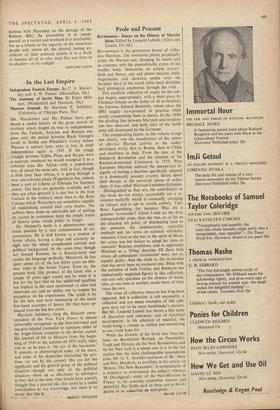Prole and Peasant
REVISIONISM is the permanent heresy of ortho- dox Marxism. The revisionist planet perpetually orbits the Marxist sun, changing its course and its contours with the unpredictable cycles of the mother body. Sometimes an eclipse occurs: faith and heresy, sun and planet become indis- tinguishable and darkness settles over the Socialist third of the world while local divinities hurl ideological anathemas through the void.
This excellent collection of essays on the sub- ject begins, appropriately, with a short piece by Christian Gneuss on the father of all revisionism, the German Eduard Bernstein, whose ideas the SPD largely incorporated in practice, while noisily condemning them in theory. In the 1890s the dividing line between Marxism and revision- ism was clear-cut, and both sides of the battle were still dominated by the Germans.
The complicating factor, as this volume brings out clearly, was the transference of the centre of effective Marxist activity to the under- developed world, first to Russia, then to China and elsewhere in Asia. From the time of the Bolshevik Revolution and the creation of the Russian-dominated Comintern in 1919, West European Marxists suffered the unexpected in- dignity of having a doctrine specifically adapted to a dominantly peasant country thrust down their throats as the universal canon of ortho- doxy. It was called Marxism-Leninism-Stalinism.
Distinguished as they are, the contributors to this book do not always successfully net a re- visionist butterfly which is constantly changing its colours and is apt to vanish entirely. Take Rosa Luxemburg, for instance. Was she a genuine 'revisionist'? Given Lenin as the first, unimpeachable pope, then she was, in so far as she attacked his policy of distributing land to the peasants, his undemocratic, centralist methods and his views on national self-deter- mination. Close as she was to the spirit of Marx, her crime was her failure to adapt her ideas to 'concrete' Russian conditions, and to appreciate Marxism as a 'living' doctrine. Of these twin errors all subsequent 'revisionists' -were, per se, equally guilty. And the truth is, the revisionist club has never been an exclusive one. What with the inclusion of both Trotsky and Bukharin (an undeservedly neglected figure) in this collection, one can only speculate on the absence of Stalin, who, at one time or another, made many of their views his own.
The value of collective research has long been apparent, but a collection is not necessarily a collective and too many examples of this cate- gory turn out to be mere bookbinder's excuses. But Mr. Leopold Labedz has shown a-fine sense of discretion and relevance, and of historical development, in his selection of material, the result being a volume as unified and stimulating as one could hope for.
While the, division of the book into four sec- tions on Revolution ReVised, on Personality, Truth and History, on the New Revisionism and on the New Left is a sound one, it is in the last section that the most challengeable assumptions arise. Mr. G. L. Arnold's inclusion of Mr. Amis and Miss Murdoch, as novelists, in his article on 'Britain, The New Reasoners,' is symptomatic of a tendency to over-extend the subject; whereas M. Duvingaud's study of the Neo-Marxists in France is, by contrast, somewhat narrow and parochial, But faults such as these are to be ex- pected in so audacious an enterprise.-
DAVID CAME


































 Previous page
Previous page